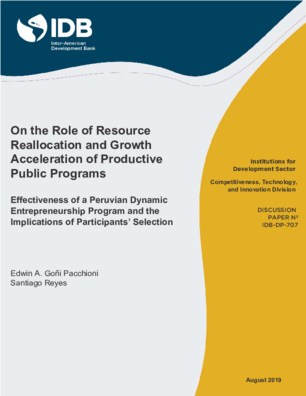On the Role of Resource Reallocation and Growth Acceleration of Productive Public Programs: Effectiveness of a Peruvian Dynamic Entrepreneurship Program and the Implications of Participants' Selection
Date issued
Aug 2019
Subject
Innovation Policy;
Innovation Ecosystem;
Impact Evaluation;
Entrepreneurship;
Synthetic Control Method
JEL code
J24 - Human Capital • Skills • Occupational Choice • Labor Productivity;
C93 - Field Experiments;
O12 - Microeconomic Analyses of Economic Development;
L26 - Entrepreneurship;
M13 - New Firms • Startups
Country
Peru
IDB series
Impact Evaluations
Category
Discussion Papers
Entrepreneurship is becoming an important source of economic activity and each time more sophisticated institutional arrangements (ecosystems) are populating more developed markets, as chances to grow fast and big in specific niches of those markets attract all necessary stakeholders for these ecosystems to work (entrepreneurs, investors, universities tech transfer offices, business accelerators, corporate and public procurers, etc.). In front of this, in less developed markets, some innovation agencies have been piloting opportunity driven startup programs, trying to cope with some of the barriers that these markets face so as to identify, select and give to potentially highly productive startups a real chance to succeed. This paper presents the results of an impact evaluation of one of those programs: Startup Peru. In doing so, the paper innovate in three ways, compared to traditional impact evaluations: first, it analyzes and emphasizes the importance of selection of most suitable candidates in the effectiveness of the program, and hence the role of resource reallocation to most productive options that public policy should play when designing and implementing this type of programs. Second, the evaluation exploits a comprehensive set of observables of the entrepreneurs, the entrepreneurial teams, the entrepreneurship and the ecosystem as well as proxies for non-observables traits such as risk aversion, self-confidence, etc. Third, the paper pays attention to impact conditional on survival as to prevent compositional changes induced by mortality of firms. The paper finds positive effects on the performance of the entrepreneurship (sales, hiring, external investment, quality of employment, etc.) but it fails to find impact on entrepreneurs’ earnings. Analysis show that in great extent this is consequence of poor selection heavily reliant on soft skills while evidence confirm the significance of traditional observables such as experience of the lead entrepreneur (as entrepreneur and in the same sector of the entrepreneurship) or the orientation of the entrepreneurship (B2B rather than B2C) as the main drivers of success. Should positive discrimination have been conducted, program’s effects could have doubled with equal or lower budget. Policy implications on selection are currently conducting the redesign of the program and the design of similar program in other ecosystems of the region.
NO



